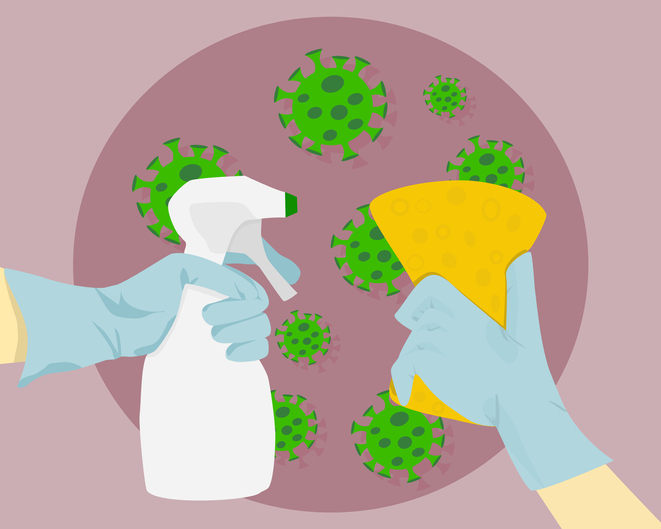
If you are one of the many grocery employees working around the clock to keep food on the shelves during the coronavirus outbreak, we know you are exhausted and struggling to balance many different responsibilities. Thank you for all you are doing, and know we’re fighting hard for the protections you deserve. You can follow updates from the UFCW at www.ufcw.org/coronavirus
Text “Prepared” to 83071 For Updates
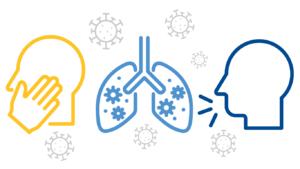
How infection happens
The primary routes of entry for the virus are the eyes, nose, and throat. Most infections will occur from either inhaling droplets from another sick person, or touching a contaminated surface and then touching your face. This is why handwashing is so important. Skin acts as a barrier, and the more you wash your hands, the more chances you have to wash off any germs you may have picked up.

How long does the virus stick around?
We’re still learning about this virus, but from what experts have said, it can linger in the air for up to three hours at the most. On stainless steel surfaces, it can last a bit longer. On porous surfaces like paper and cardboard, it can survive for up to 24 hours. It is not yet clear how long it might last on cloth such as work uniforms.

Wash your face and hands before leaving work
If you return home with dirty hands, you may touch a number of surfaces in your home before you get to your sink, let alone on the way from your work back to where you live. Wash both your face and hands before leaving your worksite and do not enter your house until you have done so.
 Wash your clothes when you get home
Wash your clothes when you get home
It’s not clear what temperature will kill the virus, but it is clear that you don’t want a bunch of contaminated work clothes laying around your house. Bag clothes worn to work and get them into the washing machine as soon as possible. Handle clothing as though it is contaminated. You may wish to use gloves, but at the very least wash your hands after getting everything into the laundry.
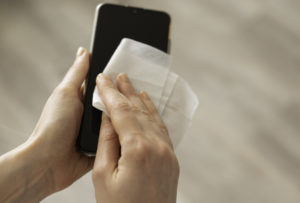 Wipe down your cell phone
Wipe down your cell phone
Wipe down your cell phone and anything else you take to work and touch frequently before you enter your home.
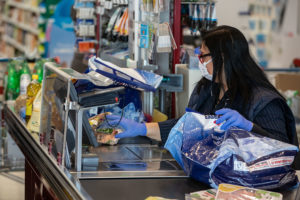 What about face masks?
What about face masks?
Face masks are tricky because not all face masks are the same. The loose, surgical masks you may have seen many people wearing are not air-tight and fitted to the face. When you breath in, air can still get around the sides and they are not considered adequate protection against breathing in the virus. They are more intended to be worn by anyone who has the virus to help prevent the spread of germs to other people in the form of exhaled droplets or other bodily fluids, which isn’t a bad thing, but it is important to know the difference. N95 respirators are different from the face masks and can protect you from inhaling up to 95% of airborne particles.

Keep 6ft between you and others
Try to maintain at least 6ft of distance between you and your coworkers, customers, or anyone else you come in contact with. The six feet of distance is intended to protect you both from exhaled airborne droplets. By keeping distance between yourself and others, you help prevent the chance of exposure. The UFCW is working with employers on ways to reduce risk of transmission within stores, such as plastic barriers between customers and cashiers, or reworking the checkout procedures.
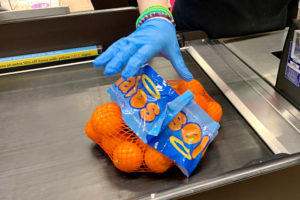 Use your gloves properly
Use your gloves properly
Even if you have gloves on, they still are not going to protect you if you touch your face while wearing them. Gloves can be worn for an extended period of time as long as they are not damaged. Remove your gloves when you go on break and wash your hands after taking them off. Do not wash your gloves. Get a fresh pair of gloves when you return to work and be sure to dispose of your old gloves properly.

Your right to refuse work
If you are over 60 or have an underlying health condition that compromises your immune system, you have the right to refuse work you feel is putting your life in immediate danger. Higher risk workers should be moved to roles with less customer interaction.
 Report any issues
Report any issues
If you are experiencing issues in your store, such as a shortage of protective equipment, lack of hand sanitizer or access to handwashing stations, please contact your local union rep and fill out this form here. The form will help us keep track of the types of problems most worker are facing and help use better work with employers to solve them.



